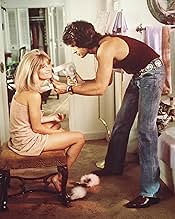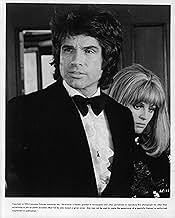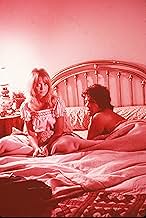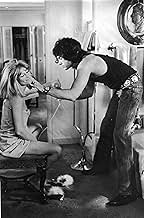On Election Day, 1968, irresponsible hairdresser and ladies' man George Roundy is too busy cutting hair and dealing with his girlfriends and mistress Felicia Karpf, whose husband Lester is h... Read allOn Election Day, 1968, irresponsible hairdresser and ladies' man George Roundy is too busy cutting hair and dealing with his girlfriends and mistress Felicia Karpf, whose husband Lester is having an affair with his ex-girlfriend Jackie.On Election Day, 1968, irresponsible hairdresser and ladies' man George Roundy is too busy cutting hair and dealing with his girlfriends and mistress Felicia Karpf, whose husband Lester is having an affair with his ex-girlfriend Jackie.
- Won 1 Oscar
- 3 wins & 11 nominations total
- Director
- Writers
- All cast & crew
- Production, box office & more at IMDbPro
Storyline
Did you know
- TriviaLee Grant claimed in her 2014 autobiography that "everyone knew" Goldie Hawn and Warren Beatty were sleeping together, even though he was still involved with Julie Christie.
- GoofsThe Coca-Cola can George drinks from while chatting with Lorna is a post-1968 design.
- Quotes
George Roundy: Can't we just, eh, be friends?
Lorna: Okay.
[teen-aged Lorna makes George an offer he can't refuse]
Lorna: You wanna fuck?
- Crazy creditsIn the opening credits, horror film producer/actor William Castle is billed as "Bill Castle," but in the end credits he is back to "William Castle."
- ConnectionsFeatured in Precious Images (1986)
- SoundtracksWouldn't It Be Nice
(1966) (uncredited)
Music by Brian Wilson
Lyrics by Tony Asher, Mike Love and Brian Wilson
Performed by The Beach Boys
Shampoo is a sex comedy in that most, if not all, of its jokes revolve around sex, or at least the implication that sex has taken place or might be about to take place. As a result it is arguable that the comedy is a bit thin and repetitive, and it is true that the story is hardly bursting with riotous wit. And yet ace screenwriter Robert Towne constructs situations that are funny in their believable social awkwardness. They might only raise a chuckle or two over the course of a scene, but they have an almost soap opera quality which keeps us watching. Besides, there's a bit more going on here than bedroom humour. The decision to set it seven years in the past seems strangely arbitrary at first, but it has a surprisingly moving impact when political events start to creep into the narrative, and Warren Beatty's womanising antics are put into some perspective.
Like all comedies, a lot of its success or otherwise depends on the acting performances. This was largely an age of realism in acting, but here the performances are just on the comedic side of real. Nobody does anything which is exactly funny in its own right, but it often is funny in its timing and context. For example, there is Beatty's mumbled excuse to Carrie Fisher (whom he has just had sex with) when he is dragged off by Lee Grant (who intends to have sex with him). Similarly, a lot of Jack Warden's self-important manliness is funny in the context of the fact that Beatty is busy screwing his wife, mistress and teenage daughter. Lee Grant gives another of her typically attention-grabbing minor roles, the authoritative society lady one minute, girlishly sipping a soft drink through a straw the next. Returning to Beatty, I'm also vaguely amused by the way he emphasises the last syllable in "pancreas" during the first scene, as if it's some kind of ass.
The director here is Hal Ashby, a really fine craftsman of 70s cinema with a deceptively simple approach. He doesn't move the camera much, and often keeps back a bit from the action, not in a cold, distant way but more to show everything that is going on in a scene and allow the actors' body language to come across as well as facial expression. This is even effective for the comedy, such as in the scene where Beatty trashes the bin outside the bank, in which the wide shot makes him look somewhat pathetic in his anger. When Ashby does move the camera it is usually to give an impression a setting or situation, often with beautiful economy, and nearly always disguised by following the movement of a character. Take the shot which introduces Jack Warden's home life. He enters from one end of the room, kisses his daughter in mid-shot and surrounded by lots of colour. Then as he crosses what turns out to be a rather large room, the camera wheels round, to reveal his wife sitting alone amid stark white furnishings. An editor before he took up directing, Ashby clearly knows the potentially comedic value of a well-timed crosscut. For example, after the scene in which Warden discusses whether or not Beatty is "a fairy", we cut to a shot of Beatty blow-drying a woman's hair, her face virtually in his crotch.
But there is one thing that makes Shampoo really stand out, and this is something which comes both from Ashby's direction and the Towne/Beatty screenplay: Despite coming from a more liberated era, it still has the artful good taste of the sex comedies of the 30s. It resists the temptation to become soft porn or a string of gross-out jokes. There is only a little partial nudity, and for the most part we do not see much of the sex acts, only their beginnings and aftermaths. And this is an era in which a fairly graphic sex scene was fast becoming a staple of any romantic movie. Despite its being a comedy almost wholly concerned with one man's sexual adventures, Shampoo is a surprisingly mature and refreshingly intelligent motion picture.
- How long is Shampoo?Powered by Alexa
Details
- Release date
- Country of origin
- Language
- Also known as
- Sosyete kuaförü
- Filming locations
- 2270 Bowmont Drive, Beverly Hills, California, USA(Jackie's House at Bowmont & Hazen)
- Production companies
- See more company credits at IMDbPro
Box office
- Budget
- $4,000,000 (estimated)
- Gross US & Canada
- $49,407,734
- Gross worldwide
- $49,407,734
Contribute to this page


































